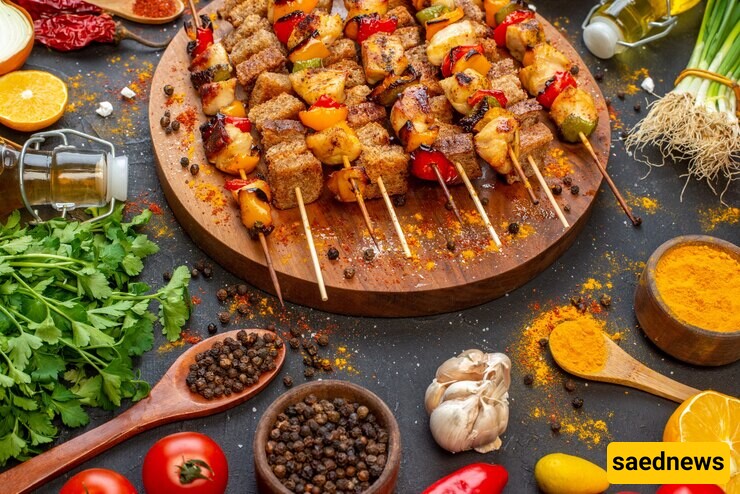SAEDNEWS: Some foods have gone beyond mere nutrition to become significant cultural symbols. This article delves into how certain dishes have evolved into icons of identity, tradition, and celebration around the globe.

According to SAEDNEWS: food is more than just sustenance—it holds cultural, emotional, and symbolic significance. Throughout history, various dishes have evolved beyond the kitchen to represent national pride, religious practices, and social identity. Whether it's a humble loaf of bread or a lavish banquet, the foods we eat often carry stories of tradition and meaning.

Bread is one of the oldest foods known to humankind and holds deep symbolic meaning across cultures. In many societies, bread is associated with life itself. In Christianity, for example, bread represents the body of Christ during the Eucharist. In ancient civilizations, bread was considered a vital source of sustenance, often seen as the foundation of survival.
For many cultures, bread is more than a simple food item—it is a symbol of hospitality, unity, and community. Whether shared during a family meal or offered as a gift, bread plays an important role in social and cultural rituals worldwide.

Rice is central to the diets of millions and is a symbol of fertility, abundance, and prosperity in various cultures. In countries like China, India, and Japan, rice is not just a food but a sacred symbol of good fortune. In Chinese culture, rice is often used during weddings and harvest festivals to ensure a prosperous future. Similarly, in Hinduism, rice is a key offering during religious ceremonies, signifying the sustenance of life and spiritual growth.
The symbolism of rice extends beyond its nutritional value, as it plays an essential role in cultural practices and beliefs about growth, prosperity, and good fortune.

Chocolate is often associated with love, indulgence, and luxury. Its origins can be traced back to the ancient Mesoamerican civilizations, where cacao was revered as a divine gift. The Aztecs and Mayans believed chocolate had spiritual and medicinal powers, and it was often consumed during sacred rituals.
In modern times, chocolate has become a symbol of affection, commonly given as gifts on Valentine’s Day, birthdays, or anniversaries. The rich, luxurious nature of chocolate also makes it a symbol of indulgence, often reserved for special occasions or celebratory moments.

Tea holds a revered place in cultures around the world, particularly in countries like China, Japan, and England. For centuries, tea has been an integral part of social and religious rituals, symbolizing calm, unity, and mindfulness.
In China and Japan, tea ceremonies are elaborate, spiritual events that emphasize mindfulness and respect. In England, the tradition of afternoon tea is a beloved social custom, symbolizing hospitality and a moment of respite from the day. The calming nature of tea has made it a global symbol of relaxation, reflection, and hospitality.

Olive oil has long been a symbol of peace, health, and vitality. In ancient Greece, olive branches were given as prizes to victorious athletes, signifying both honor and peace. The olive tree itself is considered a symbol of endurance and wisdom, deeply rooted in Mediterranean culture.
Olive oil’s association with health and well-being has grown in modern times, as it is a key ingredient in the Mediterranean diet, praised for its health benefits. It continues to symbolize the connection between food and longevity, embodying a lifestyle of balance and vitality.

Cheese, particularly in Europe, is a symbol of tradition and craftsmanship. In countries like France, Italy, and Switzerland, cheese-making is a centuries-old practice passed down through generations. The process of aging cheese is often seen as an art form, and particular types of cheese are closely tied to the regions in which they are made.
In some cultures, cheese is also considered a symbol of wealth and status. In medieval times, cheese was often a luxury item enjoyed by the aristocracy. Today, cheese remains a central element of many cultures’ culinary identity, symbolizing heritage, quality, and artisanal craft.

Spices, such as saffron, pepper, and cinnamon, have been symbols of trade, wealth, and exploration for centuries. The spice trade was a driving force behind global exploration during the Age of Discovery, with European nations competing for control of spice routes.
Spices have also come to symbolize luxury, exoticism, and refinement. In many cultures, they represent the fusion of flavors, history, and global interconnectedness. Today, they are integral to many cuisines, symbolizing the blending of tradition and global influences.
Certain foods have transcended their roles as mere sustenance, evolving into powerful cultural symbols that reflect our values, beliefs, and identities. From the daily rituals of breaking bread to the indulgence of chocolate as a symbol of love, these foods connect us to our past, shape our present, and inspire our future. As food continues to be an essential part of human experience, its symbolic significance remains deeply rooted in the cultures that cherish it.

